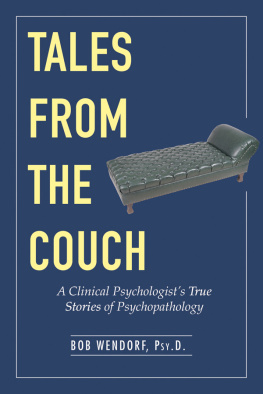Copyright 2015 by Bob Wendorf
All Rights Reserved. No part of this book may be reproduced in any manner without the express written consent of the publisher, except in the case of brief excerpts in critical reviews or articles. All inquiries should be addressed to Carrel Books, 307 West 36th Street, 11th Floor, New York, NY 10018.
Carrel Books may be purchased in bulk at special discounts for sales promotion, corporate gifts, fund-raising, or educational purposes. Special editions can also be created to specifications. For details, contact the Special Sales Department, Carrel Books, 307 West 36th Street, 11th Floor, New York, NY 10018 or .
Carrel Books is a registered trademark of Skyhorse Publishing, Inc., a Delaware corporation.
Visit our website at www.carrelbooks.com.
10 9 8 7 6 5 4 3 2 1
Library of Congress Cataloging-in-Publication Data is available on file.
Cover Design: Owen Corrigan
ISBN: 978-1-63144-025-0
Ebook ISBN: 978-1-63144-030-4
Printed in the United States of America
This book is dedicated to my patients, without whom it could not have been written,
And to my friend and former student Jay Pesek, without whom it would not have been published.
CONTENTS
INTRODUCTION
ACTUALLY, PEOPLE ARE OFTEN DISAPPOINTED to find that my office contains no couch. The couch is a psychoanalytic furnishing with a classically Freudian slip-cover. Im not all that Freudian myself. I see a lot of kids, and a couch invites either bouncing or lounging or sibling conflict, none of which is useful to my work. I see a lot of married couples, and a couch puts them too close together to deal with their areas of conflict. You dont fight with somebody youre sharing a seat with. So theres no couch. If I did have a couch Id be tempted to nap on it, as one of my partners occasionally does, and thats not my way of practicing psychology either. Sorry, but the couch in this books title is strictly metaphorical.
What I do have is thirty-six years of experience in clinical psychology. Ive seen patients in hospitals, residential treatment centers, university counseling centers, community mental health centers, my private office, schools, their homes, even my own home. Ive developed specialties in marriage and family therapy, child and adolescent therapy, ADHD, eating disorders, pain management, and multiple personality disorder. Seems as if every time I develop a sub-specialty, the insurance companies decide they no longer want to pay for it. The result, however, is that Ive had a very broad range of experience and met all kinds of patients. Ive seen a guy who had sex with dead animals on the roadside and a woman whose neurofibromatosis left huge masses growing off her body almost like clusters of brown grapes. I faced a man with a rifle, whod been laid off for fighting at work and was threatening to kill somebody. I worked with a couple where the wife was positive her husband was faithful, but he told me privately he crept off to see his paramour while she slept. No serial killers, thank God, but Ive seen most everything else.
Ive had opportunities to witness unusual events and meet fascinating people Id never have experienced outside of psychology. I was brought into the operating room to view a coronary by-pass so I could knowledgeably interview patients for a training film. The mans heart was an arms length away, as I chit-chatted with his surgeons like somebody from a M.A.S.H . episode. Another time I held the hand of a schizophrenic patient as a carcinoma was carved off her nose. I got liberally sprayed with blood on that occasion, and the smell of her arteries being cauterized made me a bit green in the face, but she wouldnt allow the procedure without my presence.
The inspiration for this book came from my son Marc and his wild and crazy friends Wes, Chris, and Creighton, who loved to hear stories of the strange and fascinating patients Ive seen. The book is a compilation of some of my most interesting and entertaining cases, and, I hope, a quick summary of what they have taught me about life and the human condition. Some are funny and some bizarre; some are gross and some tragic. But all these stories are about real people, even if Ive altered the tales a bit and changed patients names to protect their confidentiality. The people in this book are real, and their struggles and agonies and sorrows and triumphs are all real. I want them to know that I respect their efforts, share in their accomplishments, regret their failuresand mineand value them as fellow rafters on the white-waters of life. Theyve been my career and my life, and I appreciate them all, even the ones whove called me at midnight to say theyre NOT suicidal, or have thrown up in my trash can, or just came in to flirt with my office manager. The work gets tedious at times, and the paperwork onerous; managed care is diligently trying to destroy my profession; its not a royal road to riches; and you meet some truly obnoxious, even dangerous people. But psychologists rarely complain of boredom.
Ive been listening to people tell me their stories for thirty-six years. Thank you for listening now to my own talesfrom the couch.
A Word about Confidentiality and Terminology
AS IVE SAID, THESE STORIES are all about real people, people who have been my patients. Thus, I have an ethical and legal, as well as a moral, duty to protect their privacy and respect their confidence. I have tried to do that in every way I can, by changing their names, altering their professions, and revising the facts of their cases in various other ways. Its been difficult for some of the stories, as the true facts are essential for understanding the clinical dynamics of the cases. My Aspergers patient, for example could not have been transformed into a Sinatra impersonator; its Elvis or it makes no sense. Thus, it is conceivable that a reader might be able to identify one of these patients, and thereby gain access to privileged information, despite my best efforts to prevent this. Should that happen, I would beg such a reader to keep the information to himself, and I apologize if I have done anyone any harm. My purpose in telling these stories is purely to inform and entertain my readers. Ive been psychologically accurate, and all the events and characters Ive described are real. But in my telling of these stories, doctors become lawyers, geography has been shifted, and patient characteristics have occasionally been re-assigned. For example, I did indeed put two MPD patients in the same hospital roombut not necessarily the two Ive described.
So, even if you think you know someone, the new facts you discover may well belong to someone else.
Some readers may object to certain terms that appear in this book. It is certainly not my intention to offend. I maintain that psychiatry (and other fields) have played the name game for too long, pretending to make progress while simply retitling the same conditions. For example, mental retardation (which, in its literal sense, is a fairly accurate term) replaced formerly technical terms that had come to have a pejorative connotation. Idiot and moron were both proper medical terms with precise definitions. Now mentally retarded has similarly been rejected as unacceptable in favor of mentally challenged. Likewise, changing from Manic-Depressive Disorder to Bipolar Disorder reflects no progress in understanding the condition itself. In fact, I find the new term misleading.
Of course, one day soon the new terminology may be rejected. In all of these cases, the condition is unchanged, no matter the name. I have used terminology that was common when I practiced, and that is commonly used by many practitioners today.









